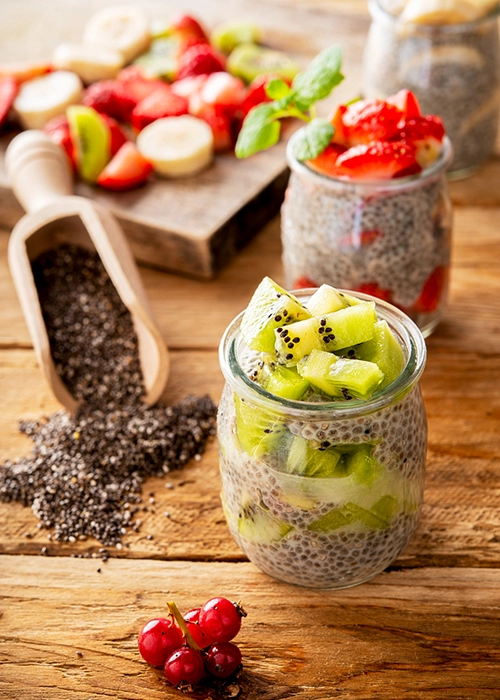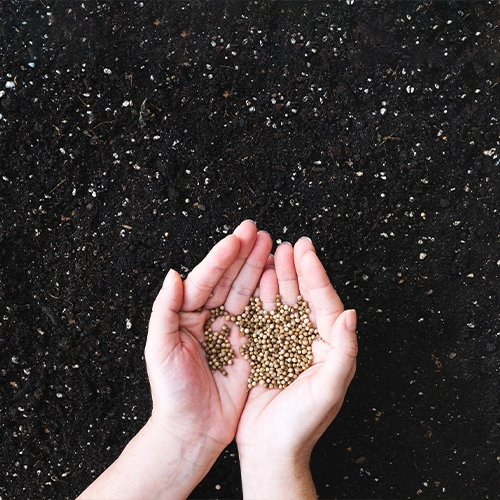Chia Seeds
Chia seeds have gained significant popularity in recent years due to their numerous health benefits. These tiny seeds are nutrient-dense, making them a valuable addition to any diet.
The Benefits of Adding Chia Seeds to Your Diet
Chia seeds are small black or white seeds derived from the Salvia hispanica plant, native to Central America. They have been a part of human diets for over 5,000 years, serving as a staple food for the Aztecs and Mayans.
Nutrient-Dense Superfood
Chia seeds are a nutritional powerhouse, packed with essential nutrients that support overall health and well-being. These tiny seeds are loaded with:
- Fiber: Aids in digestion and helps maintain stable blood sugar levels.
- Protein: Provides all nine essential amino acids, making it a complete protein source.
- Omega-3 Fatty Acids: Essential for heart health and brain function.
- Minerals: Rich in calcium, magnesium, phosphorus, zinc, and copper, which are crucial for bone health, metabolic processes, and immune function.
- Antioxidants: Protect the body from oxidative stress and inflammation.
Abundant in Essential Minerals
Chia seeds are a rich source of essential minerals:
- Magnesium: Supports muscle and nerve function.
- Phosphorus: Crucial for strong bones and teeth.
- Zinc: Aids in immune system health and wound healing.
- Copper: Vital for forming red blood cells and maintaining healthy blood vessels.

Health Benefits of Chia Seeds
High in Fiber:
Just one ounce of chia seeds provides 11 grams of fiber, nearly half the recommended daily intake for adults. This high fiber content helps promote digestion and can aid in weight management.
Rich in Omega-3 Fatty Acids:
Chia seeds are one of the best plant-based sources of omega-3 fatty acids, essential for heart and brain health.
Source of Essential Minerals:
Chia seeds contain important minerals such as calcium, magnesium, and phosphorus, which contribute to bone health and nerve function.
Versatile in Cooking:
Chia seeds can absorb up to 10 times their weight in liquid, forming a gel-like consistency. This makes them perfect for making chia pudding, adding to smoothies or baked goods, or using as an egg substitute in vegan recipes.
Growing Areas of Chia Seeds
Chia plants (Salvia hispanica) thrive in low-maintenance conditions, making them an excellent addition to any garden. Known for promoting heart health, these seeds are packed with antioxidants and omega-3 fatty acids. Incorporate these tiny seeds into your diet for a nutritious boost!

Frequently Asked Questions About Chia Seeds
What Are the Nutritional Benefits of Chia Seeds?
Chia seeds are rich in fiber, omega-3 fatty acids, essential minerals, and antioxidants. They also provide plant-based protein and healthy fats.
How Can I Incorporate Chia Seeds Into My Diet?
Chia seeds can be sprinkled on top of salads, yogurt, or oatmeal for added nutrients and texture. They can also be used as a thickening agent in soups or as an egg substitute in baking recipes.
Are Chia Seeds Safe to Eat Raw?
Yes, chia seeds are safe to eat raw. In fact, soaking them in water or milk is a popular way to consume them and allow the gel-like consistency to form.
Can Chia Seeds Help With Weight Loss?
Due to their high fiber content and ability to absorb liquid, chia seeds can help you feel fuller longer and potentially aid in weight loss.
Can Chia Seeds Be Consumed by Those With Nut Allergies?
Yes, chia seeds are a great option for those with nut allergies as they are not related to tree nuts or peanuts. However, it’s always best to consult with your doctor before incorporating new foods into your diet if you have any food allergies or sensitivities.
Contact Us for More Information
Discover our diverse portfolio of quality dry food products from South and Central America that meet the unique tastes and preferences of the U.S. Hispanic market and the general public.
